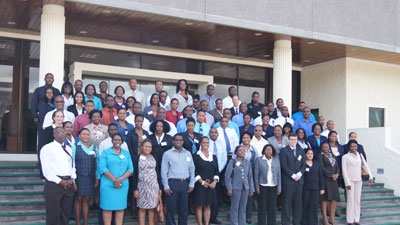Challenge
Credit unions are key players in the financial sector of OECS countries, holding deposits for over half of the working population. Although these institutions are the main vehicle of financial inclusion, most local jurisdictions provide no effective regulation, prudential oversight, or customer protection mechanisms. Thus, savings of economically vulnerable populations are at risk. Many credit unions lack investors who bring financial and governance discipline to operations. While credit unions serve populations that may otherwise be excluded from financial services, this is no excuse for weak financial oversight.
Solution
Recognizing their limited institutional and regulatory capacity as a risk for vulnerable populations, the OECS Governments, working with the ECCB, initiated regulatory reform of the non-banking financial sector, which included a review of regulatory arrangements, drafting of harmonized legislation, preparation of prudential and financial reporting requirements, development of standards and supervision manuals, and training of regulators and industry professionals.
In 2008, the OECS governments conducted Reports on the Observance of Standards and Codes (ROSC) Accounting and Auditing. Recommendations from these diagnostic exercises provided a basis for a sub-regional grant-financed technical assistance project focused on non-banking financial institutions in six OECS countries, implemented through the ECCB. Outreach to regulators and practitioners, including a sub-regional consultations process, various workshops, and hands-on direct assistance were provided.
The Project helped develop and implement medium-term strategic plans for oversight and regulation of non-banking financial institution. To that end, the Project supported the development of comprehensive financial regulations and supervision manuals, and delivered a sub-regional training program focused on financial and prudential reporting requirements for regulators and industry practitioners. On-site inspections were conducted in four OECS countries, targeting credit unions holding significant shares of population deposits. These provided key insights into sectoral practices, and enabled supervisors to collaborate, based on the process’ cross-jurisdictional nature. It also helped regional authorities assess the systemic risk and tailor mitigating measures, thus providing much-needed protection and assurance.
Results
Upon project completion, in 2013, the savings of economically vulnerable populations are in institutions with higher standards of accounting and financial reporting and enhanced consumer protection mechanisms, and are overseen by strengthened regulatory entities, which collectively provide an enhanced early-warning of systemic risk. This was effected through the development of comprehensive financial regulations and supervision manuals, a sub-regional training program focused on financial and prudential reporting requirements for regulators and industry practitioners delivered jointly with the International Financial Reporting Standards (IFRS) Foundation, and the development and implementation of medium-term strategic plans guiding further development of oversight and regulatory practices in the non-banking financial sector.
